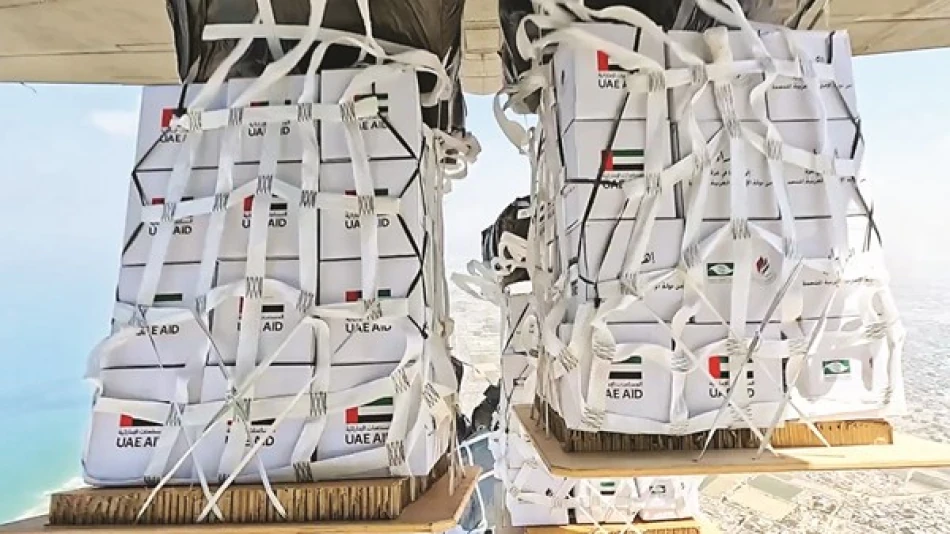
UAE Continues Aerial Support for Palestinian People in Gaza
UAE Delivers 76th Airdrop to Gaza as Humanitarian Crisis Deepens
The United Arab Emirates has completed its 76th airdrop of humanitarian aid to Gaza as part of its expanding "Operation Chivalrous Knight 3," delivering over 4,020 tons of critical supplies through international partnerships that underscore the Gulf state's growing influence in Middle Eastern diplomacy. The sustained operation reveals how regional powers are stepping into humanitarian leadership roles as traditional aid mechanisms face unprecedented challenges.
Multinational Coalition Emerges Around UAE Initiative
The latest airdrop, conducted under the "Birds of Goodness" sub-operation, involved coordination with Jordan and participation from Germany, France, the Netherlands, Singapore, and Indonesia. This diverse coalition highlights the UAE's diplomatic reach and ability to mobilize both regional allies and European partners around humanitarian objectives.
The inclusion of Singapore and Indonesia particularly signals the UAE's success in engaging Asia-Pacific nations in Middle Eastern humanitarian efforts—a diplomatic achievement that extends beyond immediate relief operations into broader geopolitical relationship-building.
Infrastructure Strategy Goes Beyond Emergency Relief
Unlike typical humanitarian responses focused on food and medical supplies, the UAE's approach encompasses comprehensive infrastructure development. The Emirates has established field hospitals in Rafah and Al-Arish, launched the "Lifeline" water project to secure water sources for displaced populations, and initiated well-drilling and pipeline maintenance projects.
This infrastructure-focused strategy reflects lessons learned from previous humanitarian crises where short-term aid failed to address underlying systemic needs. By investing in water systems and healthcare facilities, the UAE is positioning itself as a long-term partner rather than a temporary relief provider.
Local Economic Integration
The operation has evolved to include purchasing food supplies from local Gaza markets to support families and operate community kitchens serving thousands of displaced residents. This approach serves dual purposes: providing immediate relief while supporting whatever remains of Gaza's local economy.
Diplomatic Implications of Sustained Humanitarian Leadership
The UAE's sustained commitment—now spanning months with 76 separate airdrops—demonstrates a calculated diplomatic strategy. By maintaining consistent humanitarian engagement while other international actors face political constraints, the Emirates is building significant goodwill and positioning itself as a reliable partner for future regional stability efforts.
This approach echoes the UAE's broader foreign policy evolution over the past decade, where humanitarian leadership has become a cornerstone of its international influence, from Yemen to Afghanistan to current Gaza operations.
Timing with World Humanitarian Day
The UAE's emphasis on continuing operations during World Humanitarian Day reinforces its commitment to the humanitarian principles established by the late Sheikh Zayed bin Sultan Al Nahyan. This connection to founding values provides domestic legitimacy while projecting consistent international leadership.
Operational Innovation Under Pressure
Faced with significant logistical challenges in delivering aid to Gaza, the UAE has developed alternative delivery mechanisms that could serve as models for future crisis responses. The combination of land, sea, and air corridors, along with local procurement strategies, represents an adaptive approach to humanitarian logistics under conflict conditions.
The sustained nature of these operations—maintaining 76 separate airdrops while expanding into infrastructure and local economic support—suggests the UAE views this not as emergency response but as long-term engagement that will likely continue regardless of immediate political developments.
For regional observers, the UAE's humanitarian leadership in Gaza represents a broader shift in Middle Eastern dynamics, where Gulf states are increasingly taking initiative on issues traditionally managed by global powers, potentially reshaping how future crises are addressed across the region.
Most Viewed News

 Layla Al Mansoori
Layla Al Mansoori






